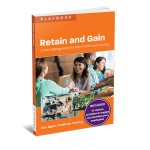Big changes on the way for ContactPoint
November 1, 2018
10 questions for Dr Mary McMahon
November 9, 2018Filling the research gap on ‘seniorpreneurs’

There has been relatively little research, or even interest, in investigating the characteristics of older entrepreneurs in Canada. This research fills an information gap by providing Canadian data about the needs and interests of seniorpreneurs, the results of which can be used by career counsellors to coach and guide older clients. Among the findings:
- Nearly four in 10 older entrepreneurs face gaps in the support they need to launch or develop their businesses
- 37% of the respondents aged 50+ had challenges in accessing financial or government support and mentors
- The top reason identified by respondents to start a business after 50 was interest in continuing to use their skills
The report offers recommendations to enhance the state of senior entrepreneurship in Canada, including: providing support for all entrepreneurs regardless of age; standardizing programs and services available to support this senior cohort; and providing career-transition services for older workers who are leaving traditional jobs.
Access the final report at ceric.ca/seniorpreneur.
Canada should improve labour-market outcomes for immigrants, women: report
The Organisation for Economic Co-Operation and Development (OECD) released its Economic Survey of Canada 2018 report in July. The OECD found that Canada’s economy has returned to buoyant growth with the help of stimulus measures following the weak patch caused by the 2014 energy price slump. However, the report stated that Canada’s labour productivity was below the OECD average. It also asserted that Canada’s aging population and weak productivity growth will present long-term challenges.
The report highlighted that Canada’s gender employment gap, which is considerably larger than the OECD average, has not shrunk since 2009. The report stated that the effects of population aging could be mitigated by improving labour-market outcomes for women, youth and seniors.
While the report commended Canada for its successful immigration policies, it also noted that labour-market integration challenges persist. When compared with Canadian-born workers within comparable education, age and geographical brackets, immigrants earn considerably less. The OECD urged Canada to improve integration measures and to select immigrants with higher earnings prospects to reduce the wage gap.
Read the Economic Survey at oecd.org – Economic Surveys.
Playbook provides comprehensive career-management tool for non-profits

Written in an innovative “travel guide” format, the Playbook is intended for executive directors and people managers to use as a practical career management tool with their employees in charities of all sizes. It features strategies to engage full-time and part-time staff in ways that advance, develop and support thriving careers within the sector. This includes more than 40 practical, low-cost tips, activities and actions that can be implemented in as few as 10 minutes a day.
You can download the Playbook free, or it will also be for sale in hard copy as well as ebook formats.
Download the Non-Profit Retain and Gain Playbook or learn how to buy a copy at ceric.ca/nonprofit.
Excitement building for Cannexus19
Planning is well underway for Cannexus19, taking place Jan. 28-30, 2019 in Ottawa. This bilingual conference is Canada’s largest for career counsellors, career development professionals and the career services sector. The Cannexus19 National Career Development Conference will feature more than 130 education sessions. Topics include:
- Effective counselling & facilitation techniques
- Labour market information
- Career assessment tools
- Post-secondary & graduate employment
Deborah Saucier, Right Hon David Johnston and Mary McMahon will present keynote addresses. Cannexus will also feature a Mega Panel on Theories and Models at Work – Ideas for Practice.
Cannexus19 is expected to bring together 1,000 career development professionals from education, government, community and private sectors. The conference is designed to promote the exchange of information and explore innovative approaches in the areas of career counselling and career development.
Register for Cannexus19 by Nov. 7, 2018 to get the Early Bird rate, a savings of $75 on the three-day rate.
Learn more about Cannexus19 and register at cannexus.ca.
Many students lacking paid work experience in their field: poll
A survey of 1,000 Canadian adults, 18 to 29, from the Canadian Alliance of Student Associations (CASA) revealed that while students believe in the value of experiential learning, they are often unable to find paid work placements. The survey found nearly half of current students have not done paid work related to their field of study or through their academic program. However, the poll also found students believe paid work placements related to their field of study are the best type of experience to help new graduates get a good job. More than half (57%) of current students reported having participated in an unpaid work placement.
CASA recommendations for the federal government include:
- Expanding the Canada Summer Jobs program to reach 10,000 additional students
- Investing in programs that connect Indigenous and marginalized youth with employers and the labour market
- Increasing youth access to career education
- Increasing access to apprenticeships, as well as vocational education and training
- Developing a well-co-ordinated and highly visible school-to-work transition strategy
Access the survey at casa-acae.com.
George Brown College launches new career development program
George Brown College, located in downtown Toronto, launched its Career Development Practitioner program this fall. The year-long (three-semester) program is shorter than the diploma program it replaced. Graduates of the program, which the College says is more practical and responds to employer demands for trained workers, will earn an Ontario College Graduate Certificate. The program maintains a generalist perspective, with such courses as Trends in Career Development, Professional Practice, and Individual Counselling and Coaching. Part-time and online learning options are available.
The program includes an experiential learning component in the third semester, which will see students attend a placement several times a week with the support of an advisor. Placements are chosen by students and approved by the program co-ordinator. Students can choose to work in a variety of settings, from community-based organizations to the private sector, vocational rehabilitation programs and government departments. The practicum component allows graduates to partly fulfil the work experience hours required by the Career Development Practitioners’ Certification Board of Ontario. As well, the program’s ethics courses are designed to meet the Certified Career Development Practitioner certification.
Visit georgebrown.ca/programs to learn more about the Career Development Practitioner program.

